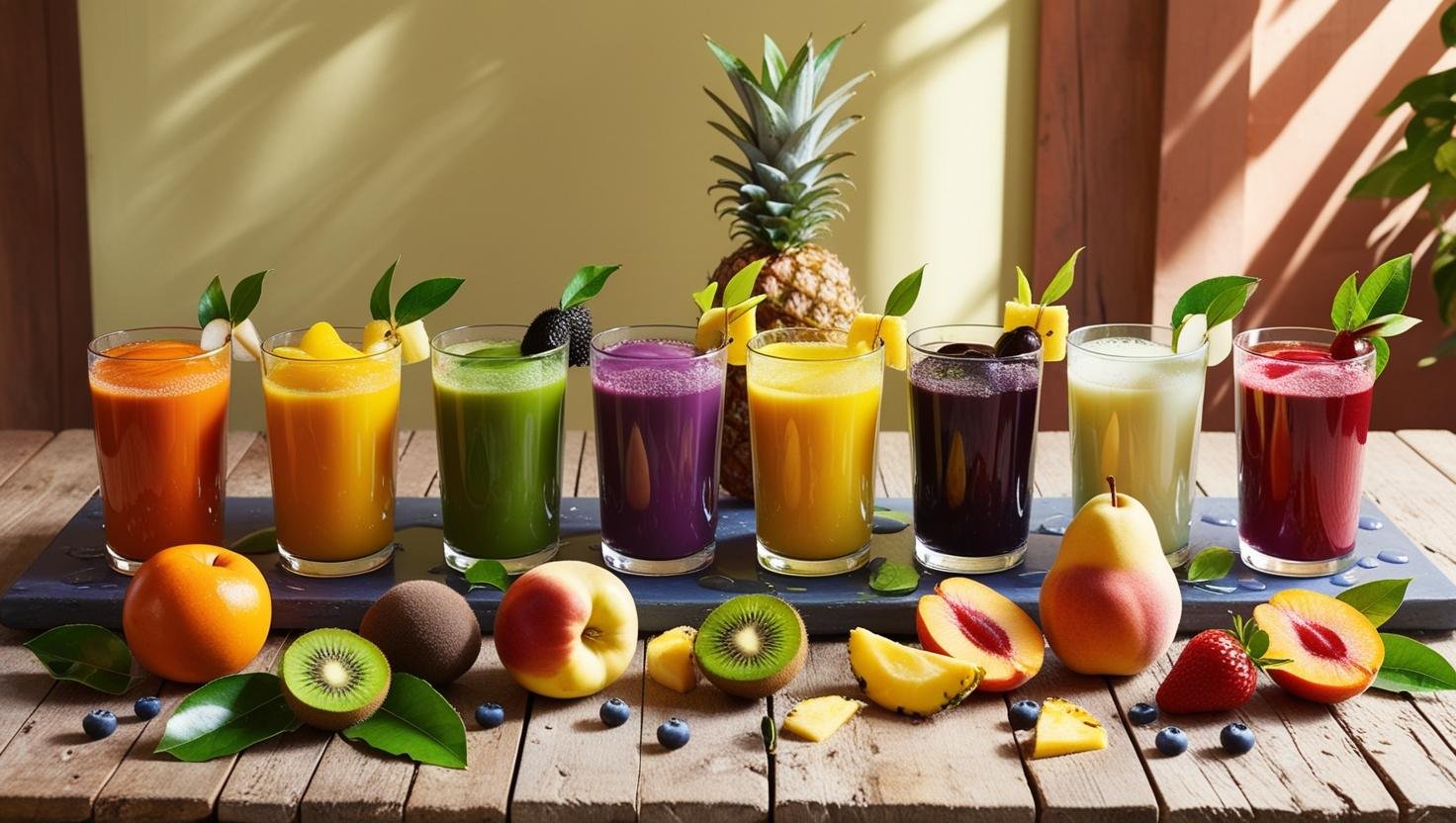Table of Contents
9 Essential High-Fiber Fruit Juices to Boost Your Digestion
Digestive health is foundational to overall well-being. Proper digestion impacts everything from nutrient absorption to energy levels and immune function. One of the key nutrients in maintaining a healthy digestive system is fiber, yet many people fall short of their daily requirements. Integrating high-fiber fruit juices into your daily routine is a simple, tasty, and effective way to increase fiber intake, support digestion, and enhance gut health.
In this article, we explore the best high-fiber fruit juices to incorporate into your diet. From traditional options like pulp-rich orange juice to exotic choices like kiwi juice, these nutrient-packed beverages provide an easy route to better digestive health. Whether you’re battling occasional digestive discomfort or simply looking to boost your fiber intake, these juices can help you achieve your health goals.
Why Fiber Is Essential for Digestive Health
Fiber plays a crucial role in the digestive process. It’s not just about preventing constipation—fiber impacts blood sugar levels, cholesterol, and gut health. Here’s a quick breakdown of the two main types of dietary fiber and how each contributes to digestive wellness:
- Soluble Fiber: Dissolves in water and forms a gel-like substance. This type of fiber slows down digestion, aiding in the regulation of blood sugar levels and lowering cholesterol. It also promotes a stable and comfortable digestive process.
- Insoluble Fiber: Does not dissolve in water, instead, it helps move food through the digestive tract. This promotes regular bowel movements and prevents constipation, keeping your digestive system functioning smoothly.
A well-balanced diet should include both types of fiber. Health guidelines suggest that adults should aim for 25–30 grams of fiber daily, but research shows that most people consume only half this recommended amount. Integrating high-fiber fruit juices into your routine can be a convenient way to bridge the gap and ensure that your digestive health is on the right track.
Benefits of High-Fiber Fruit Juices
Opting for high-fiber fruit juices can make meeting your daily fiber goals easier. These juices are not just a refreshing treat; they offer several digestive benefits:
- Increased Stool Bulk: Fiber adds bulk to stool, which facilitates regular bowel movements and helps prevent constipation.
- Enhanced Satiety: Fiber takes longer to digest, so consuming fiber-rich juices can make you feel full for longer periods, reducing unnecessary snacking.
- Support for Healthy Gut Bacteria: Fiber acts as a prebiotic, nourishing the beneficial bacteria in your gut. A healthy gut microbiome is crucial for effective digestion and overall immunity.
To explore more about how dietary fiber supports digestive health and overall well-being, refer to the Dietary Guidelines for Americans.
High-Fiber vs. Regular Fruit Juices
Many commercially available fruit juices are low in fiber due to extensive filtration and pasteurization processes, which remove the fiber-rich pulp. High-fiber fruit juices, in contrast, retain much of this pulp, preserving the fiber content. Opting for these pulp-rich versions or making juices at home allows you to enjoy the full benefits of natural dietary fiber.
To illustrate the contrast between regular and high-fiber juices, consider the graph below:
Graph Analysis: This graph highlights the substantial difference in fiber content between regular fruit juices (usually strained and filtered) and high-fiber juices that retain pulp. The increased fiber content in high-fiber juices contributes directly to digestive health benefits.
How High-Fiber Fruit Juices Improve Digestive Health
High-fiber fruit juices don’t just enhance your fiber intake—they also bring a host of specific digestive benefits. Here’s a closer look:
| Benefit | High-Fiber Fruit Juice Contribution |
|---|---|
| Regulates Bowel Movements | Fiber adds bulk to stool, easing passage through intestines. |
| Feeds Healthy Gut Bacteria | Acts as a prebiotic, supporting beneficial gut bacteria. |
| Promotes Satiety | Slows digestion, helping control appetite and reduce snacking. |
| Supports Blood Sugar Levels | Soluble fiber helps moderate blood sugar spikes. |
Making the Right Choice: Tips for Selecting High-Fiber Fruit Juices
Choosing the right high-fiber fruit juice can maximize your digestive health benefits. Here are some tips to ensure you make the best choice:
- Opt for Pulp-Heavy Juices: The fiber is in the pulp, so choose juices labeled “with pulp” or those that list fiber content on the label.
- Avoid Added Sugars: Sugars can disrupt gut health. Stick to pure juices without added sugars or artificial sweeteners.
- Check the Fiber Content: Not all juices are created equal. A glance at the nutrition label can help you determine if a juice truly delivers a high fiber content.
With this foundation laid out, let’s dive into the top 9 high-fiber fruit juices that can transform your digestive health. These selections are not only nutritious but also refreshing, making it easier to include them in your daily routine.
Top 9 High-Fiber Fruit Juices to Include in Your Diet
1. Orange Juice with Pulp
Orange juice is a beloved classic for many, but its benefits go beyond taste when you opt for a version that includes the pulp. The pulp in orange juice is packed with both soluble and insoluble fiber, which work together to enhance digestive health. Here’s why orange juice with pulp deserves a spot in your daily diet:

Key Benefits:
- Rich in Vitamin C: Orange juice is famous for its high Vitamin C content, a powerful antioxidant that helps combat inflammation in the digestive tract. Reducing inflammation is essential for maintaining a healthy gut lining, promoting overall digestive wellness.
- Natural Fiber Boost: The pulp provides a balanced blend of soluble and insoluble fiber, promoting gut motility and facilitating regular bowel movements. This combination supports smoother digestion, making it easier for food to travel through the intestines without discomfort.
Best Time to Drink: Morning. Starting the day with orange juice that includes pulp can energize you and kickstart your digestive system, setting a healthy tone for the day.
2. Apple Juice with Added Fiber
Apples are a well-known source of dietary fiber, particularly pectin, a soluble fiber that offers numerous digestive benefits. While regular apple juice tends to be low in fiber, some brands have started offering apple juice with added fiber to enhance its digestive advantages. Choosing this type of juice can be an excellent way to get the best of both flavor and health benefits.
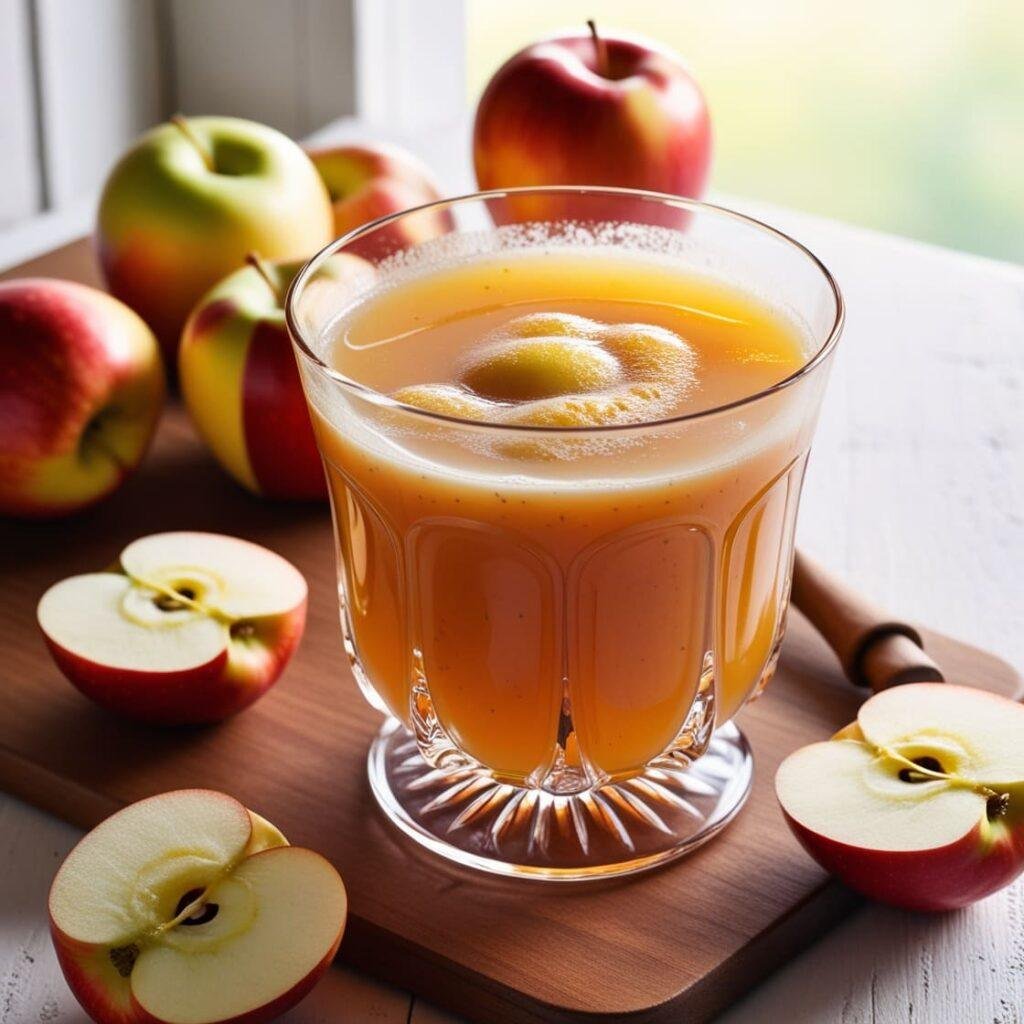
Key Benefits:
- Supports Gut Microbiota: Pectin acts as a prebiotic, promoting the growth of beneficial gut bacteria. These bacteria are essential for breaking down food efficiently and maintaining a balanced gut environment, which is crucial for overall digestive health.
- Regulates Bowel Movements: The pectin in apple juice works as a natural stool softener, helping to prevent constipation. This makes it a great choice for individuals who want a gentle, fiber-rich drink that supports regularity without being harsh on the stomach.
Best Time to Drink: Afternoon. A glass of apple juice with added fiber in the afternoon is a light, hydrating choice that keeps your digestion in check throughout the day.
3. Pear Juice
Often overlooked, pear juice is an excellent high-fiber beverage that deserves more recognition. Pears are rich in sorbitol, a sugar alcohol that naturally draws water into the intestines, functioning as a mild, natural laxative. This makes pear juice particularly useful for people struggling with constipation or sluggish digestion.
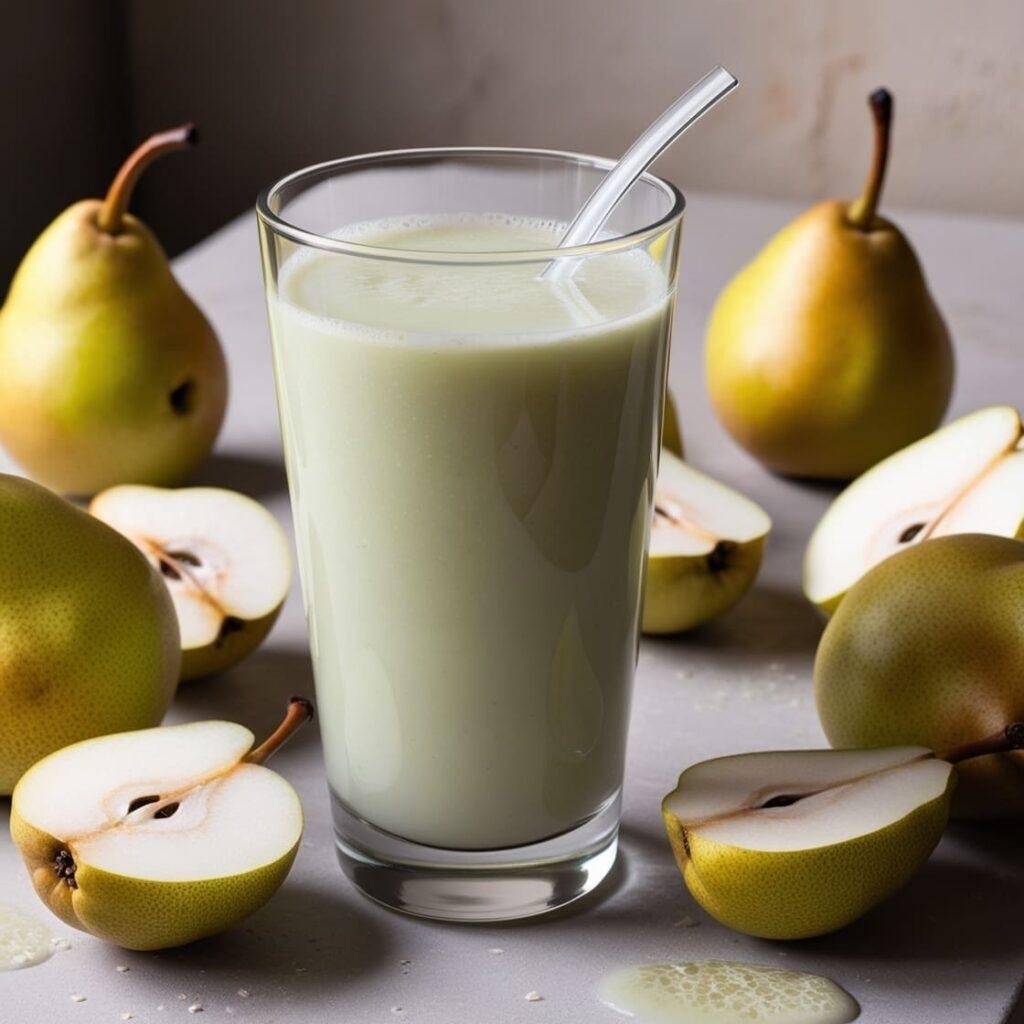
Key Benefits:
- Smooth Digestive Aid: The combination of soluble and insoluble fibers in pear juice works to soften stools and regulate bowel movements. The gentle nature of pear juice makes it ideal for those with sensitive digestive systems.
- Packed with Antioxidants: Pear juice is also loaded with antioxidants, which play a significant role in reducing inflammation and oxidative stress within the digestive tract, ensuring a healthy gut environment.
Best Time to Drink: Evening. The soothing qualities of pear juice make it an ideal choice for a calming evening drink that supports digestion before bedtime.
4. Prune Juice
Prune juice has long been a go-to for promoting digestive health, especially due to its potent natural laxative effects. Prunes, or dried plums, are extremely high in fiber and sorbitol, making prune juice one of the best options for those dealing with constipation.
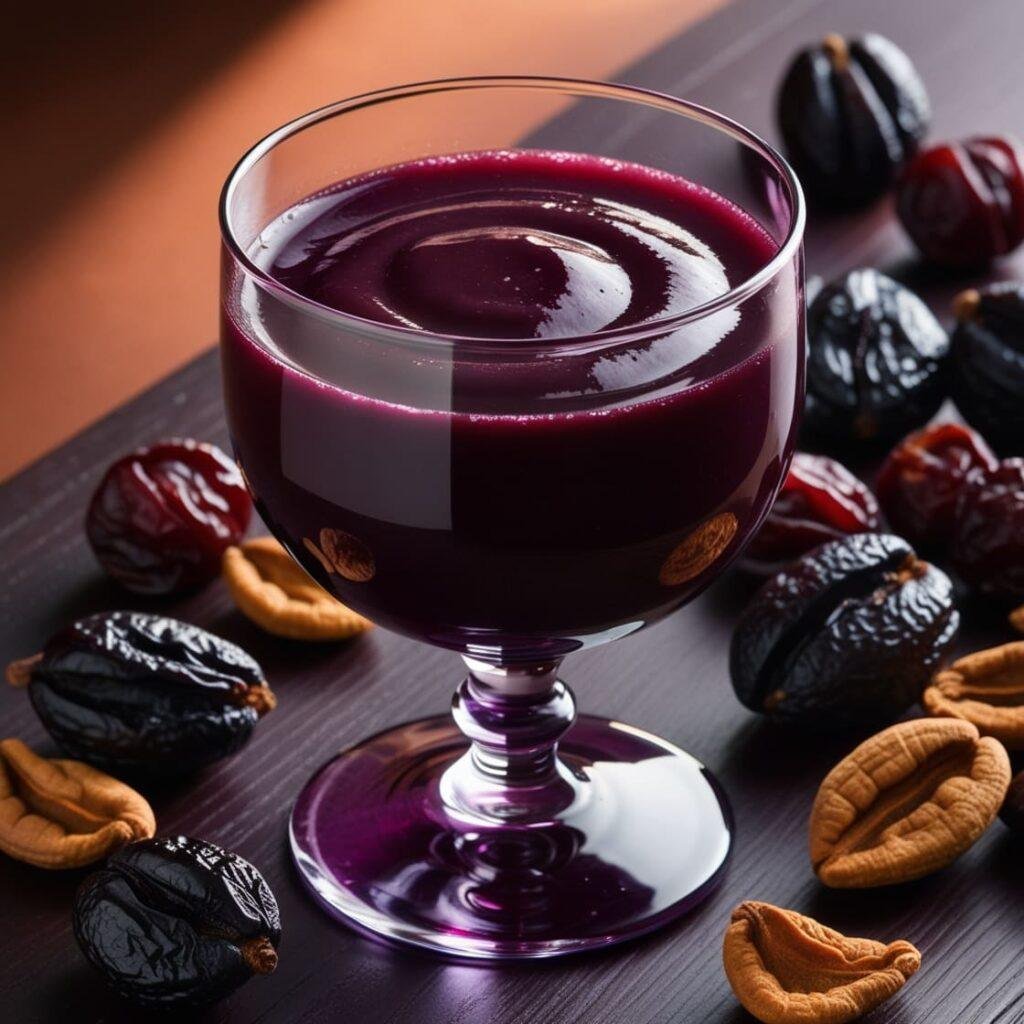
Key Benefits:
- Promotes Regularity: The combination of soluble fiber and sorbitol in prune juice draws water into the intestines, softening the stool and encouraging regular bowel movements. This makes prune juice a reliable and natural remedy for constipation.
- High in Potassium: In addition to fiber, prune juice is rich in potassium, a mineral that supports healthy muscle contractions, including those in the digestive tract. This ensures that the intestines function efficiently, aiding in the smooth passage of food.
Best Time to Drink: Morning or early afternoon. Drinking prune juice early in the day can help stimulate digestion and keep your system on track.
5. Pineapple Juice with Fiber Additives
Pineapple juice is not only a tropical delight but also offers unique benefits for digestion. What makes pineapple juice particularly beneficial for your gut health is the enzyme bromelain, which aids in breaking down proteins. Adding fiber to pineapple juice further enhances its digestive properties, making it a top choice among High-Fiber Fruit Juices.

Key Benefits:
- Reduces Bloating: Bromelain helps digest proteins more efficiently, which can reduce feelings of bloating and gas after meals. The added fiber ensures that food moves smoothly through the digestive system.
- Boosts Digestive Enzymes: When combined with extra fiber, bromelain works to improve nutrient absorption, ensuring your body makes the most out of each meal. The fiber content supports healthy bowel movements, preventing constipation.
Best Time to Drink: After meals, especially those that are high in protein. Pineapple juice with fiber additives acts as a digestive aid, helping your body break down complex foods more effectively.
6. Kiwi Juice
Kiwi juice is a lesser-known but incredibly effective option among High-Fiber Fruit Juices. Kiwis are a powerhouse of fiber and contain actinidin, an enzyme that helps digest proteins more efficiently. With both soluble and insoluble fibers, kiwi juice offers a comprehensive solution to digestive health.
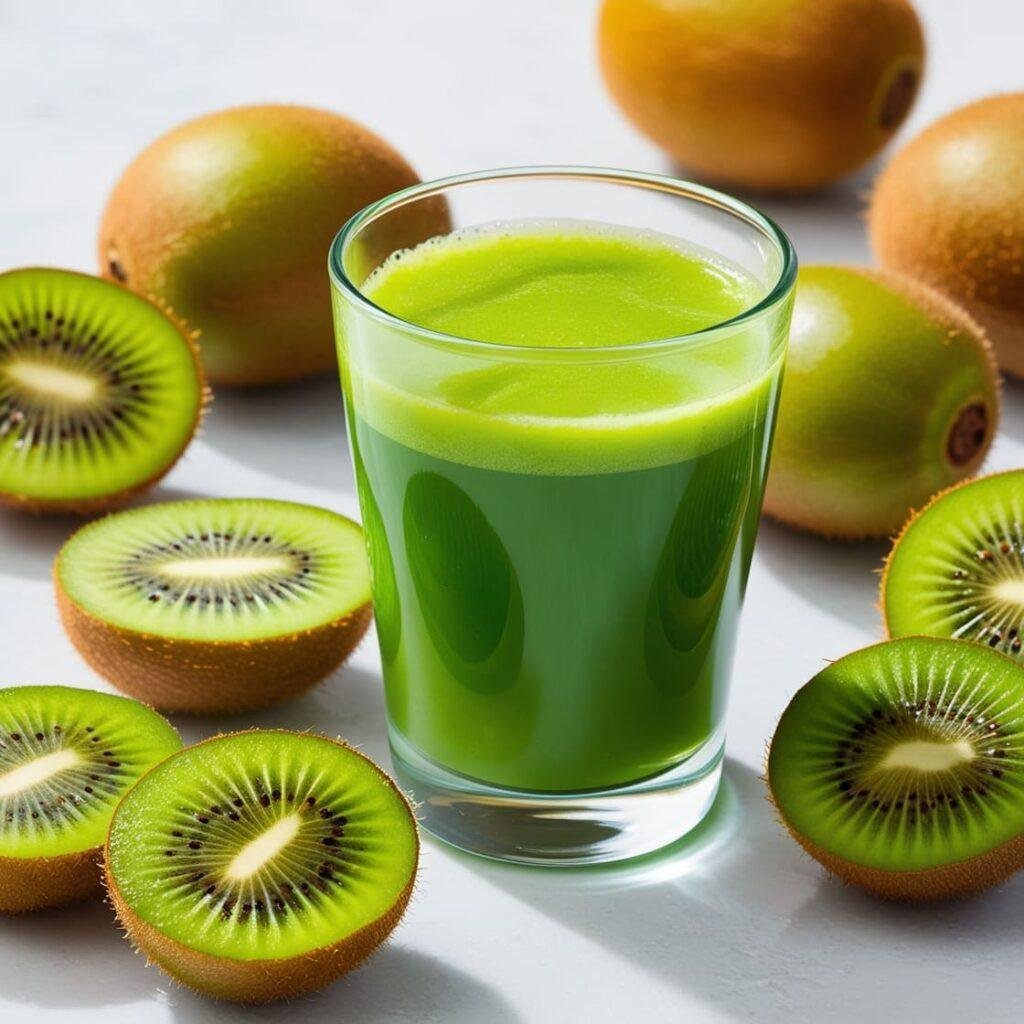
Key Benefits:
- Alleviates Indigestion: The enzyme actinidin in kiwi juice enhances protein breakdown, which can help ease indigestion and reduce the risk of bloating. It’s particularly useful for individuals who struggle with heavy meals or discomfort after eating.
- High Fiber Content: Kiwi juice’s fiber is a mix of soluble and insoluble types, helping to regulate bowel movements and keeping your digestive system balanced. This makes it an ideal juice for promoting a regular digestive cycle.
Best Time to Drink: Mid-morning. Drinking kiwi juice at this time can help you maintain a steady energy level while promoting optimal digestion throughout the day.
7. Mango Juice
Mango juice is both sweet and packed with nutrients that promote digestive health. It’s one of the tastier choices among High-Fiber Fruit Juices and contains amylase, an enzyme that assists in breaking down complex carbohydrates. This enzyme, combined with the fiber in mangoes, makes mango juice a delicious way to support your digestive system.
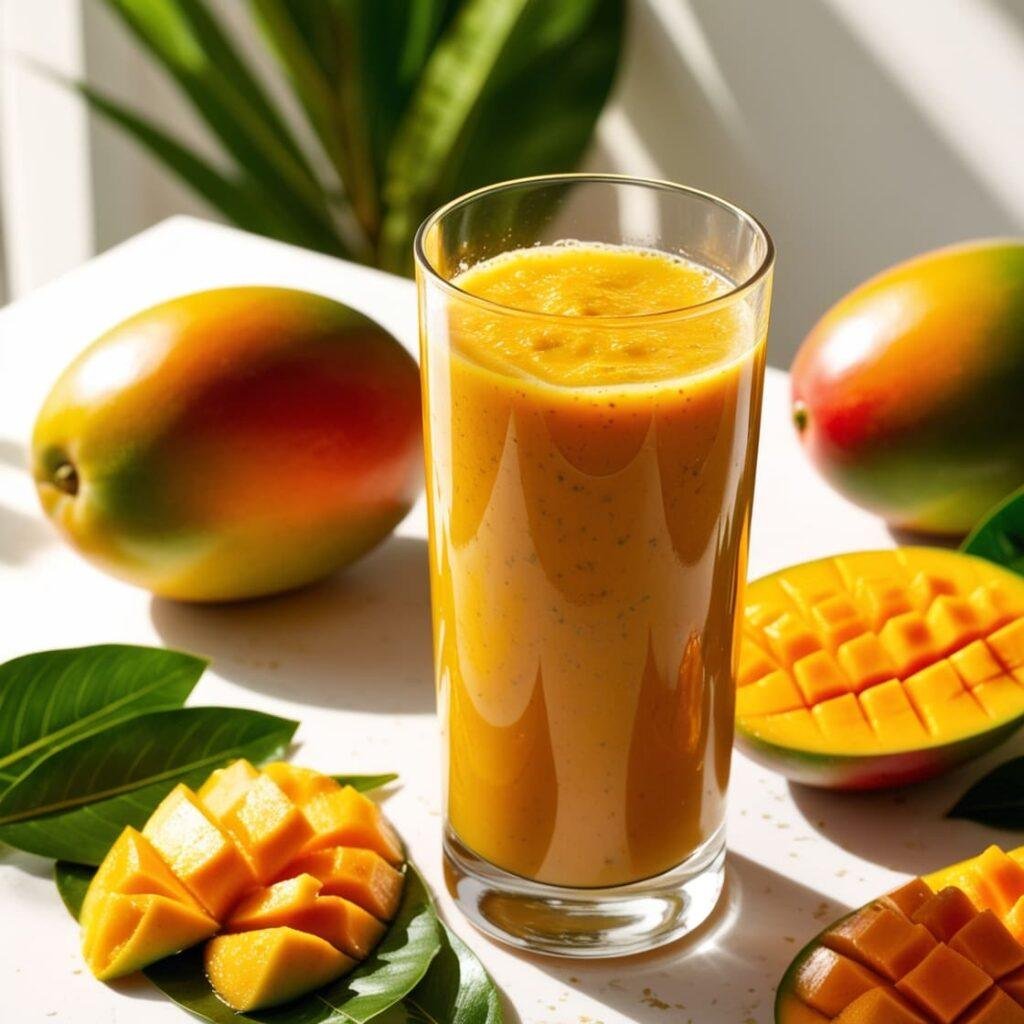
Key Benefits:
- Enhances Gut Flora: Mango juice is rich in both dietary fiber and prebiotic compounds, which serve as food for the beneficial bacteria in your gut. A healthy gut flora aids in better digestion and reduces digestive discomfort.
- Rich in Vitamin A: The high Vitamin A content in mangoes helps maintain the health of the gut lining, protecting it from irritation and inflammation. This is crucial for those with sensitive digestive systems.
Best Time to Drink: Afternoon. A refreshing glass of mango juice can provide a natural energy boost and assist in digestion, especially after lunch.
8. Peach Juice
Peach juice is often underrated, but it’s one of the most effective High-Fiber Fruit Juices for maintaining smooth digestion. Peaches are gentle on the stomach, making them ideal for people who experience digestive sensitivities. Peach juice is rich in a blend of soluble and insoluble fibers, which ensures a balanced digestive process.
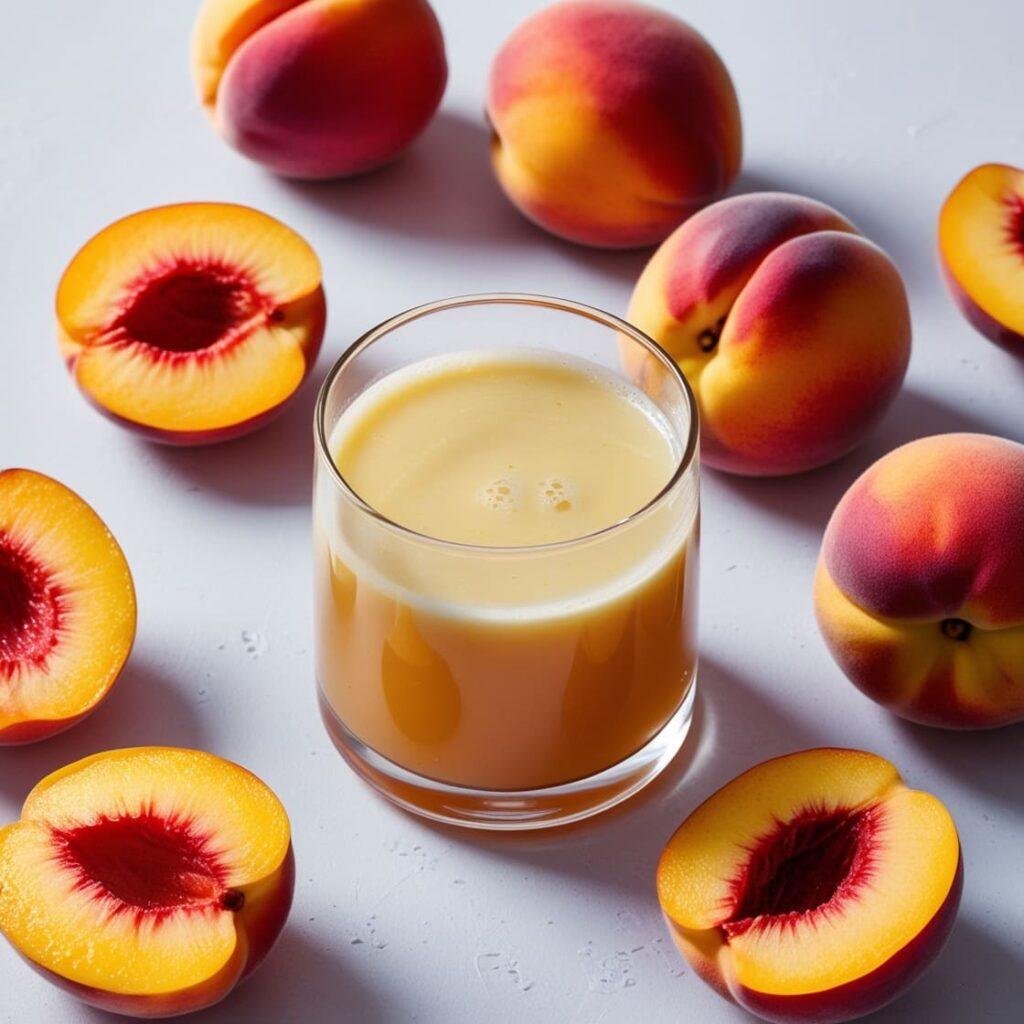
Key Benefits:
- Anti-Inflammatory Properties: Peaches contain antioxidants that help reduce inflammation in the gut, which can be beneficial for individuals with digestive issues or sensitive stomachs. A reduction in inflammation supports a smoother and more comfortable digestive experience.
- Fiber for Regularity: The combination of soluble and insoluble fibers in peach juice supports regular bowel movements, preventing constipation and promoting gut health. This balance is key for a comfortable digestive process.
Best Time to Drink: Morning or evening. Peach juice is a light and soothing choice that can be enjoyed as a part of breakfast or a calming evening beverage.
9. Mixed Berry Juice
Mixed berry juice is a delicious and nutrient-dense option among High-Fiber Fruit Juices. Made from fruits like strawberries, blueberries, and raspberries, this juice is packed with fiber and antioxidants, making it a superb choice for anyone looking to boost digestive health naturally.
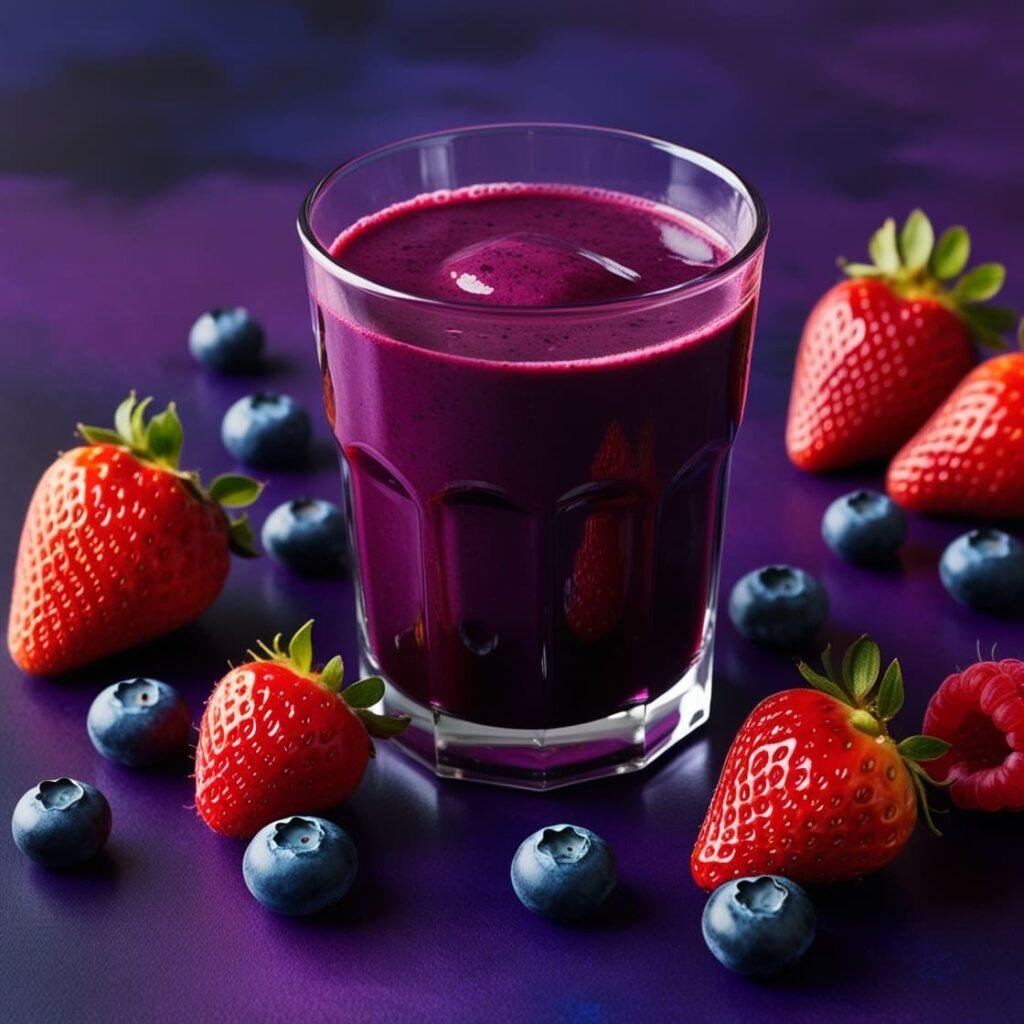
Key Benefits:
- Rich in Antioxidants: The high levels of antioxidants in mixed berries help protect the digestive tract from oxidative stress and inflammation. These antioxidants support the health of the gut lining and may even reduce the risk of digestive disorders over time.
- Promotes Digestive Health: The dietary fiber in mixed berries encourages the growth of beneficial gut bacteria and supports a balanced digestive process. It also aids in regulating bowel movements, ensuring that your digestive system runs smoothly.
Best Time to Drink: Anytime throughout the day. Mixed berry juice is versatile and can be enjoyed at any time, making it a convenient way to get a fiber boost whenever needed.
Additional Tips for Choosing High-Fiber Fruit Juices
When incorporating High-Fiber Fruit Juices into your diet, it’s important to make informed choices to maximize the digestive benefits. Below are some practical tips to ensure you select the best options for your health:
1. Prioritize Pulp-Heavy Juices
Opt for juices labeled “with pulp” or “extra pulp” to get the full benefits of fiber. The pulp is where most of the fiber resides, especially in juices like orange, apple, and grapefruit. Pulp-heavy juices retain the natural fiber of the fruit, supporting better digestion and a balanced gut.
2. Check the Ingredients for Added Fiber
Some juices are specifically fortified with fiber to boost their health benefits. Look for phrases like “added fiber” or “fortified with fiber” on the packaging, which indicates that the juice contains more fiber than the standard varieties. This can be particularly helpful if you’re aiming to meet your daily fiber goals.
3. Avoid Juices with Added Sugars
Sugar can negatively impact gut health, disrupting the balance of beneficial bacteria. Choose juices that are free from added sugars and artificial sweeteners. Look for labels that say “100% juice” or “no added sugars” to ensure you’re getting the healthiest option possible.
4. Read the Nutrition Labels
Not all fruit juices are created equal. Some might appear healthy but lack substantial fiber content. Take a moment to review the nutrition labels on the back of the bottle, checking specifically for dietary fiber amounts per serving. Aim for juices with at least 2–4 grams of fiber per serving to get a meaningful digestive benefit.
5. Go Homemade for Maximum Benefits
If you have the time, making homemade juices is the best way to control the fiber content. Use a blender rather than a juicer to keep the fiber-rich pulp intact, ensuring you get the maximum amount of natural fiber. Homemade juices also allow you to experiment with combinations of fruits that might not be readily available in store-bought options.
High-Fiber vs. Regular Fruit Juices: A Closer Look
To truly appreciate the benefits of High-Fiber Fruit Juices, it’s helpful to compare them directly with regular fruit juices. Below is a detailed table showcasing the differences between high-fiber and regular fruit juices:
| Feature | High-Fiber Fruit Juices | Regular Fruit Juices |
|---|---|---|
| Fiber Content | 2–6 grams per serving | Less than 1 gram per serving |
| Source of Fiber | Contains pulp and/or added fiber | Usually strained; lacks natural pulp |
| Digestive Benefits | Promotes gut motility, stool bulk, and satiety | Limited benefits due to low fiber |
| Impact on Blood Sugar | Slower sugar absorption due to fiber | Faster sugar absorption; potential spikes |
| Processing Level | Minimal processing to retain fiber | Heavily filtered; often pasteurized |
| Best Use | Daily consumption for digestive support | Occasional refreshment, low fiber impact |
Analysis:
High-fiber juices clearly outshine their regular counterparts in supporting digestive health. Their higher fiber content slows down sugar absorption, helps regulate blood sugar levels, and encourages a feeling of fullness—key elements for maintaining a healthy digestive system. Additionally, the fiber contributes to increased stool bulk and regular bowel movements, two crucial aspects of gut health that regular fruit juices cannot offer.
Conclusion: Why High-Fiber Fruit Juices are a Digestive Game-Changer
Incorporating High-Fiber Fruit Juices into your daily routine can make a significant difference in your digestive health. From classic choices like orange juice with pulp to nutrient-rich options like kiwi and pear juice, the variety of high-fiber juices available ensures there’s something to suit every taste preference. These juices offer more than just hydration; they are a delicious and convenient way to consume essential nutrients that support gut health.
The benefits of drinking high-fiber fruit juices go beyond digestion, impacting overall well-being:
- Supports Weight Management: The fiber in these juices promotes satiety, reducing the likelihood of overeating and helping with weight management.
- Improves Heart Health: A diet high in fiber can lower cholesterol levels and reduce the risk of heart disease, making high-fiber juices a heart-healthy choice.
- Enhances Nutrient Absorption: A balanced digestive system is better equipped to absorb vitamins and minerals from the food you eat, leading to improved overall nutrition.
To get the best results, prioritize juices that retain their natural pulp, avoid added sugars, and consider making your own at home. A daily glass of these juices can help you meet the recommended fiber intake of 25–30 grams for adults, contributing to a well-functioning digestive system and a healthier lifestyle.
How to Incorporate High-Fiber Fruit Juices Into Your Routine
To maximize the benefits of High-Fiber Fruit Juices, consider these practical tips for incorporating them into your daily diet:
1. Start Your Morning Right
Kick off your day with a refreshing glass of high-fiber orange juice with pulp. This not only provides a burst of energy but also primes your digestive system for the meals ahead.
2. Pair with Meals
Have a glass of pineapple or kiwi juice with lunch to aid in digestion. These juices contain enzymes that support the breakdown of proteins, ensuring you digest your food comfortably.
3. Snack Alternative
Instead of reaching for a mid-afternoon snack, opt for mango or mixed berry juice. The fiber content will keep you feeling full while supporting your digestive health.
4. Pre-Bedtime Digestive Aid
End your day with a soothing glass of pear or peach juice in the evening. These gentle, fiber-rich options can calm your digestive system and help prevent nighttime digestive discomfort.
